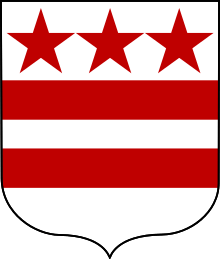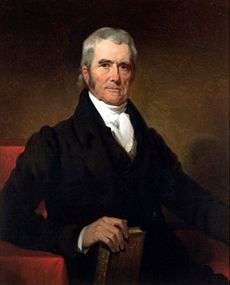Bushrod Washington
Bushrod Washington (June 5, 1762 – November 26, 1829) was an attorney and politician who served as Associate Justice of the Supreme Court of the United States from 1798 to 1829. On the Supreme Court, he was a staunch ally of Chief Justice John Marshall.
Bushrod Washington | |
|---|---|
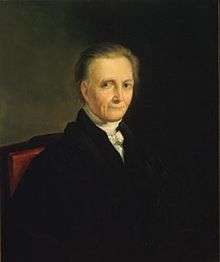 Washington in 1828. Currently in the National Portrait Gallery | |
| Associate Justice of the Supreme Court of the United States | |
| In office December 20, 1798 – November 26, 1829 | |
| Nominated by | John Adams |
| Preceded by | James Wilson |
| Succeeded by | Henry Baldwin |
| Member of the Virginia House of Delegates from Westmoreland County | |
| In office October 15, 1787 – June 23, 1788 | |
| Preceded by | Daniel McCarty |
| Succeeded by | William A. Washington |
| Personal details | |
| Born | June 5, 1762 Mount Holly, Virginia, British America |
| Died | November 26, 1829 (aged 67) Philadelphia, Pennsylvania, U.S. |
| Political party | Federalist |
| Education | College of William and Mary (BA) |
Washington was a co-founder and president of the American Colonization Society, which promoted the emigration of freed slaves to Africa. The nephew of American founding father and President George Washington, he inherited his uncle's papers and Mount Vernon, taking possession in 1802 after the death of Martha Washington, his uncle's widow.
Early life
Bushrod Washington was born on June 5, 1762, at Bushfield Manor, a plantation home located at Mount Holly in Westmoreland County, Virginia.[1][2] He was a son of John Augustine Washington (1736–1787), the brother of George Washington, and John's wife, Hannah Bushrod (1735–1801).[2][3]
Washington graduated from the College of William & Mary in 1778 and as an alumnus became in 1780 the 41st member of Phi Beta Kappa.[4] After beginning with John Marshall the study of law under George Wythe in 1780, he joined the Continental Army during 1781 and served as a private until 1782.[5][6]
After Bushrod left the army, his father and his uncle, George Washington, sponsored his further legal studies with James Wilson.[7] After concluding his studies with Wilson in April 1784, the young Washington returned to Westmoreland County, married Julia Anne (Anna) Blackburn, and opened a law office.[8] He was in the private practice of law from 1784 to 1798.[5]
Political and judicial career
Washington was elected to the Virginia House of Delegates in 1787.[1] In 1788, he served in the Virginia Ratifying Convention, where he voted for ratification of the US Constitution.[9]
On September 29, 1798, Washington received from President John Adams a recess appointment to the seat on the US Supreme Court vacated by James Wilson after John Marshall had declined the appointment while seeking an elective office.[5][6] Formally nominated on December 18, 1798, Washington was confirmed by the United States Senate on December 20, 1798, and received his commission the same day.[5]
Washington became an associate justice on February 4, 1799, at the age of 36.[5] After Marshall became Chief Justice two years later, Washington voted with Marshall on all but three occasions (one being Ogden v. Saunders).[10] Washington served on the Supreme Court until his death in 1829.[5]
While serving on the Marshall Court, Washington authored the opinion of Corfield v. Coryell, 6 Fed. Cas. 546 (C.C.E.D. Penn. 1823), while riding circuit as an Associate Justice.[11] In Corfield, Washington listed several rights that he deemed were fundamental "privileges and immunities of citizens in the several States."[12]
Residences
Around 1795, Washington purchased Belvidere, the former Richmond estate of William Byrd III. He relinquished Belvidere upon his appointment to the Supreme Court in 1798.[13]
Upon his aunt Martha Washington's death in 1802, Bushrod Washington inherited all of his uncle George Washington's papers as well the largest part of his estate, including the Mount Vernon plantation, as bequeathed in his uncle's will.[14] By George Washington's will, George's slaves were to be freed after his wife Martha died, as she had the use of them during her lifetime.[15] However, Martha freed the slaves before her death in an 1800 deed of manumission.[15]
When Bushrod Washington and his wife moved to Mount Vernon immediately after Martha's death, he brought his own slaves there.[1][16] The estate had not included much cash, and Washington found that he was unable to support the upkeep of the plantation's mansion on the proceeds from the property and his Supreme Court salary.[17]
As a result, the mansion deteriorated while he lived there.[18][19] As his farms were not profitable, Washington sold many of his slaves to gain working capital to support the main house and property.[17]
Society memberships
Washington was elected a member of the American Antiquarian Society (ACS) in 1813.[20] In 1816, he became a founding member of the American Colonization Society (ACS), which promoted the repatriation to Africa of slaves who had been freed in preparation for transport there.[18] Washington became the Society's first president and held that position for the remainder of his life.[18]
Washington's sales of slaves to support the upkeep of Mount Vernon angered abolitionists, who questioned why the ACS president could not set an example by freeing his slaves, as had his uncle George Washington.[17][18] They believed that he should have sent his freed slaves to Liberia.[17]
Death and interment
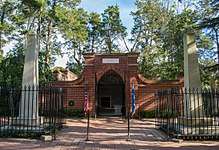
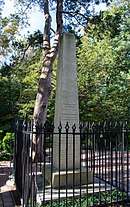
Bushrod died in Philadelphia, Pennsylvania, on November 26, 1829, while riding circuit.[1][5] His wife died two days later while transporting his body for burial.[1][21] Both are interred in a vault within the Washington family tomb at Mount Vernon.[21] An obelisk erected in front of the tomb memorializes Bushrod and his wife.[21][22]
Legacy and honors
Because of his role in the ACS and his assistance in founding the Republic of Liberia, Bushrod Island near the national capital of Monrovia was named for him.[23]
Notes
- "Bushrod Washington". Oyez: U.S. Supreme Court Multimedia. Jerry Goldman. 1997-07-16. Archived from the original on 2006-02-14. Retrieved 2015-12-27.
- Wayland, John Walter (1944). The Washingtons and Their Homes. Baltimore, Maryland: Clearfield. p. 125. ISBN 0806347759. OCLC 39055916 – via Google Books.
- (1) "Hannah Bushrod". Ancestry. 2016. Archived from the original on 2016-01-22. Retrieved 2016-01-22.
(2) "George Washington's Family Chart". Mount Vernon Ladies' Association. Archived from the original on 2011-07-17. Retrieved 2016-01-22. - (1) Vorhees, Oscar M., ed. (1919). "The Phi Beta Kappa Key: The Official Publication of the United Chapters of Phi Beta Kappa". 4 (1). Somerville, New Jersey: Unionist-Gazette: 112–113 – via Google Books. Cite journal requires
|journal=(help)
(2) Smith, Jean Edward (1996). John Marshall: Definer of a Nation. New York: Henry Holt and Company. p. 554. ISBN 9781466862319. OCLC 874903389. Archived from the original on 2016-04-25 – via Google Books. - "Washington, Bushrod". History of the Federal Judiciary: Biographical Directory of Federal Judges. Federal Judicial Center. Archived from the original on 2015-09-06. Retrieved 2015-11-30.
- Hall, Timothy L. (2001). Bushrod Washington. Supreme Court Justices: A Biographical Dictionary. New York: Facts on File, Inc. pp. 39–42. ISBN 9781438108179. OCLC 234179292 – via Google Books.
- Fister, Jude M. (2014). America Writes Its History, 1650-1850: The Formation of a National Narrative. Jefferson, North Carolina: McFarland and Company, Inc. pp. 120–121. ISBN 978-0-7864-7921-4. OCLC 859384941 – via Google Books.
- Fister, Jude M. (2014). America Writes Its History, 1650-1850: The Formation of a National Narrative. Jefferson, North Carolina: McFarland and Company, Inc. p. 122. ISBN 978-0-7864-7921-4. OCLC 859384941 – via Google Books.
- Grigsby, Hugh Blair (1890). Brock, R.A. (ed.). The History of the Virginia Federal Convention of 1788 With Some Account of the Eminent Virginians of that Era who were Members of the Body. Collections of the Virginia Historical Society. New Series. Volume IX. 1. Richmond, Virginia: Virginia Historical Society. pp. 344–346. OCLC 41680515 – via Google Books.
- Cushman, Clare: Supreme Court Historical Society, ed. (2013). Bushrod Washington. The Supreme Court Justices: Illustrated Biographies, 1789–2012 (3rd ed.). CQ Press, an imprint of SAGE Publications. p. 47. ISBN 9781608718320. OCLC 832697340 – via Google Books.
- Thayer, James Bradley (1894). Cases on constitutional law: With notes, Part 2. C.W. Sever. pp. 453–56 – via Google Books.
- "All Privileges and Immunities of Citizens in the Several States". Justia: US Law. 2015. Archived from the original on 2015-09-08. Retrieved 2015-12-29.
- Dabney, Virginius (1990). Richmond: The Story of a City: Revised and Expanded Edition. Charlottesville, Virginia: University Press of Virginia. p. 19. ISBN 0813912741. OCLC 20263021 – via Google Books.
- (1) Fister, Jude M. (2014). America Writes Its History, 1650-1850: The Formation of a National Narrative. Jefferson, North Carolina: McFarland and Company, Inc. p. 90. ISBN 978-0-7864-7921-4. OCLC 859384941 – via Google Books.
(2) Lossing, Benson J. (1870). "The Home of Washington; Or, Mount Vernon and Its Associations, Historical, Biographical, and Pictorial". Hartford, Connecticut: A.S. Hale & Company. p. 350. OCLC 1593086 – via Google Books.
(3) Washington, George (1790-07-09). "Last Will and Testament". Rediscovering George Washington. PBS. Archived from the original on 2005-02-06. Retrieved 2015-12-04.To my nephew Bushrod Washington, I give and bequeath all the Papers in my possession which relate to my Civil and Military Administration of the affairs of this Country; I leave to him also such of my private papers as are worth preserving; and at the decease of my wife, and before; if she is not inclined to retain them, I give and bequeath my Library of books, and pamphlets of every kind. ..... To my nephew Bushrod Washington and his heirs (partly in consideration of an intimation to his deceased father, while we were Bachelors, & he had kindly undertaken to superintend my Estate during my Military Services in the former War between Great Britain and France, that if I should fall therein, Mount Vernon (then less extensive in domain than at present) should become his property) I give and bequeath all that part thereof which is comprehended within the following limits, ....
- "George Washington and Slavery". George Washington's Mount Vernon: Digital Encyclopedia. Mount Vernon Ladies' Association. 2015. Archived from the original on 2015-09-05. Retrieved 2015-11-30.
- Lossing, Benson J. (1870). "The Home of Washington; Or, Mount Vernon and Its Associations, Historical, Biographical, and Pictorial". Hartford, Connecticut: A.S. Hale & Company. p. 351. OCLC 1593086 – via Google Books.
- Fister, Jude M. (2014). America Writes Its History, 1650-1850: The Formation of a National Narrative. Jefferson, North Carolina: McFarland and Company, Inc. p. 124. ISBN 978-0-7864-7921-4. OCLC 859384941 – via Google Books.
- Dunne, Gerald. "Bushrod Washington and The Mount Vernon Slaves". 1980 Yearbook. Supreme Court Historical Society. Archived from the original on 2002-10-09. Retrieved 2015-11-30.
- "The Formation of the Mount Vernon Ladies' Association and the Dramatic Rescue of George Washington's Estate". Mount Vernon Ladies' Association. Archived from the original on 2008-12-29. Retrieved 2015-11-23.
- American Antiquarian Society Members Directory
- "Burials at Mount Vernon". Digital Encyclopedia. Mount Vernon, Virginia: George Washington's Mount Vernon. Archived from the original on 2015-11-21. Retrieved 2015-12-28.
- (1) "The Tomb". Digital Encyclopedia. Mount Vernon, Virginia: George Washington's Mount Vernon. Archived from the original on 2014-10-19. Retrieved 2015-12-03.
The marble shafts in front of the Tomb were erected to the memory of Bushrod Washington and his nephew, John Augustine Washington, who in turn were proprietors of Mount Vernon. They are buried in the inner vault.
(2) "Washington Family Tomb at Mount Vernon". Original Information from Volume 5 of the Gravestone Books. Merrifield, Virginia: Fairfax Genealogical Society. 2016. Archived from the original on 2016-11-16. Retrieved 2016-11-16.Two large marble obelisks which stand in front of the new vault were erected as memorials to the private owners of Mount Vernon after George Washington's death. Both shafts were carved by "A. Gaddis Fecit. Balto": Within the vault Lie buried the mortal remains of Bushrod Washington, An associate Justice, of the Supreme Court of the U. S. He died in Philadelphia, Nov'r 26th 1829; Aged 68 By his side is interred his devoted Wife Anna Blackburn, Who survived her beloved Husband but two days. Aged 60. Judge Washington. Was the Son of John Augustine Washington and the Nephew of Genl George Washington, Who appointed him one of his Executors. And bequeathed him Mount Vernon. As a Judge he was Wise and Just. "A man of Truth, hating covetousness." Firm in every honourable purpose and pursuit, Yet gentle humane and condescending. A sincere Christian, Doing in all things the will of his Master, And resting his hope of eternal happiness, []ove on the righteousness of Jesus Christ. This humble Monument to the memory of the venerated Judge and his beloved Wife Is placed here by her Niece the Widow of his nephew. John A. Washington. ....
- Starr, Frederick (1913). Liberia: description, history, problems. Chicago: Frederick Starr. p. 9. OCLC 6791808 – via Google Books.
Further reading
- Abraham, Henry J. (1992). Justices and Presidents: A Political History of Appointments to the Supreme Court (3rd ed.). New York: Oxford University Press. ISBN 0-19-506557-3.
- Binney, Horace (1858). Bushrod Washington. Philadelphia: Printed by C. Sherman & Son. OCLC 183226515 – via Internet Archive.
- Flanders, Henry (1874). The Lives and Times of the Chief Justices of the United States Supreme Court. Philadelphia: J. B. Lippincott & Co. LCCN 12016783. OCLC 13189441 – via Internet Archive.
- Frank, John P. (1995). Friedman, Leon; Israel, Fred L. (eds.). The Justices of the United States Supreme Court: Their Lives and Major Opinions. Chelsea House Publishers. ISBN 0-7910-1377-4.
- Hall, Kermit L., ed. (1992). The Oxford Companion to the Supreme Court of the United States. New York: Oxford University Press. ISBN 0-19-505835-6.
- Martin, Fenton S.; Goehlert, Robert U. (1990). The U.S. Supreme Court: A Bibliography. Washington, D.C.: Congressional Quarterly Books. ISBN 0-87187-554-3.
- Smith, M. Earl. "Bushrod Washington". Digital Encyclopedia. Mount Vernon, Virginia: George Washington's Mount Vernon. Archived from the original on 2016-11-16. Retrieved 2016-11-16.
- Urofsky, Melvin I. (1994). The Supreme Court Justices: A Biographical Dictionary. New York: Garland Publishing. p. 590. ISBN 0-8153-1176-1.
- White, G. Edward. The Marshall Court & Cultural Change, 1815-35. Published in an abridged edition, 1991.
External links
| Wikisource has original works written by or about: Bushrod Washington |
| Wikimedia Commons has media related to Bushrod Washington. |
- Ariens, Michael, Bushrod Washington.
- Works by Bushrod Washington at Open Library
- Bushrod Washington at Find a Grave
| Legal offices | ||
|---|---|---|
| Preceded by James Wilson |
Associate Justice of the Supreme Court of the United States 1798–1829 |
Succeeded by Henry Baldwin |
